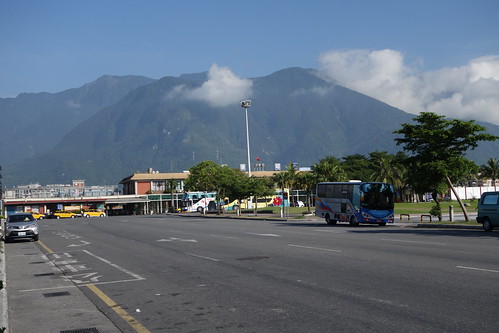Planting rice north of Taichung.
I say to you againe, doe not call up Any that you can not put downe; by the Which I meane, Any that can in Turne call up Somewhat against you, whereby your Powerfullest Devices may not be of use.
*sigh* Charles Glaser really loves to imagine himself as a Great Decider, determining the fate of millions with Grand Bargains. This latest installment of his patented point of view, "sell Taiwan to China for better relations" is
A U.S.-China Grand Bargain? The Hard Choice between Military Competition and Accommodation (International Security, Vol. 39, No. 4 (Spring 2015), pp. 49–90). Glaser appears to have learned little from
his Foreign Affairs disaster of several years ago.
The "analysis" concedes that it is merely an amoral, unreal fantasy right at the outset of his main argument, where he states: "
Analytically, the desirability and political feasibility of U.S. security policy can often be productively separated." Actually, they can't, because politics is about values and the conduct of international affairs (i.e. human affairs) is not value-free. This pretense of value-freeness is created by Glaser here in order to legitimate selling out Taiwan as the "objective" and therefore superior choice. The subtext is: "if you can't see it my way, you're too subjective". The reality is that handing over Taiwan to China is a question of
values; the reason it is politically disvalued (i.e. unfeasible) is because it is morally vile and politically stoopid.
EJInsight recently
commented on China's lack of soft power. The problem with the kind of analysis that EJInsight presents is that it doesn't recognize the truly key elements of China's soft power. Living in Taiwan and watching the media for years has made many of us acutely conscious of China's actual soft power. The
TIME interview with DPP Chairman and Presidential candidate Tsai Ing-wen shows one aspect of that soft power -- the way western commentators accept Chinese expansionist propaganda and anti-Taiwan propaganda (and propagandists) as conventional wisdom, and use it to frame their writing about China-related issues. Glaser's piece is another example of how this works: it shows the willingness of commentators in democratic countries to feed the beast. Sadly, this sort of testosterone-fueled control fantasy disguised as "analysis" has become commonplace (
Hugh White, for example).
Glaser lays out his thesis on p50:
Specifically, the United States should negotiate a grand bargain that ends its commitment to defend Taiwan against Chinese aggression. In return, China would peacefully resolve its maritime and land disputes in the South China and East China Seas, and officially accept the United States’ longterm military security role in East Asia.
After discussion of the international situation, he expands thusly:
The grand bargain I propose is designed to capture the benefits of U.S. accommodation with China, while reducing its risks. China’s concessions on its territorial and maritime disputes would communicate information to the United States about the limited extent of its aims, thereby reducing Washington’s concern that its own concessions would encourage China to push the United States out of East Asia. In addition, resolution of these disputes would eliminate flash points that fuel regional military competition and crises that could draw the United States into a war.
Much this paper is larded with the soft power problem I note above: presentation of pro-China propaganda frames as actual descriptions of China. Note how Glaser adopts Beijing's propaganda line to explain China's desire to annex Taiwan:
From China’s perspective, control of Taiwan is a security objective because China considers Taiwan part of its homeland.45 In contrast, given the United States’ understanding of the status quo, China’s determination to control Taiwan reflects greedy motives.
From the perspective of elites in Beijing, of course annexing Taiwan is pure expansion; the idea that Taiwan is a "lost territory" is strictly for the consumption of their own public and for foreigners who can be successfully propagandized. Like Glaser, for example.
(Of course, there is no Taiwan perspective in this paper. Taiwan doesn't get a vote, because this is a Grand Bargain, the kind Grand Men make over brandy and cigars. You peasants operating out of your own subjectivity don't get it, 'k? Now go fetch my slippers.)
Consider his process for implementing the Grand Bargain:
For example, stages could include resolution of how to divide maritime resources without resolution of the sovereignty issues; agreement to defer sovereignty issues; arms control agreements that limit China’s conventional ability to threaten Taiwan and Japan and the operation of U.S. forces near China’s shores; and the reduction and eventual termination of U.S. arms sales to Taiwan.
Beijing will never agree to any of this in good faith (Nor does Glaser explain why Beijing should trust the US). Moreover, China is trapped; it cannot reduce its conventional forces precisely because it has so many territorial demands on its neighbors, and because it would mean compelling the People's Liberation Army to accept a reduced role in domestic politics. Good luck with that.
Glaser and others who write from this bubbleverse accept the existence of these territorial disputes without inquiring into their origins. The reason they invariably refrain from doing so is because if they did, it would immediately become obvious that China is engaging in territorial expansion, since Taiwan, the South China Sea islands, and the Senkakus were never historically Chinese areas. Instead, they were claims manufactured after the fall of the Manchu Qing dynasty, when China was redefined in order to expand it out to the borders of the Qing. Hence any reading of these territorial demands as "China's need for security" or some such silliness
is Beijing propaganda, plain and simple.
This is crucial because if you read Glaser's paper carefully, there is a yawning gap that totally destroys his thesis. He mentions Taiwan, of course, but he also mentions the Senkakus many times.
Yet, he never mentions that Taiwan and the Senkakus (and Okinawa) are all connected in Chinese territorial demands (the ROC fantasy
here, the Xinhua rewrite of history
here). Chinese claim that the Senkakus were administered from Taiwan and are part of Taiwan. They cannot be separated into unrelated dispute bubbles the way Glaser treats them.
Thus, this current paper, just like his previous one, creates a bubble world in which there is no connection between China's expansionist claims in the South and East China Seas, and Taiwan. Indeed, the
only way you can make the argument that Taiwan should be kissed off is if you pretend that Taiwan is not related to any other goal of Chinese expansionism. Which is rank nonsense.
In the real world, though, Chinese expansionists having been claiming for decades that the Senkakus were administered by the Qing
from Taiwan, which makes them Chinese and part of the Taiwan claim. More importantly, it means that the "dispute" over Taiwan cannot be resolved by handing Taiwan over to China because that will simply bring the war over the Senkakus (and Okinawa) that much closer. Glaser learned nothing from criticism of his 2011 piece -- my comments still apply:
Thus, Glaser's position is contradictory: he argues that the US can avoid war by handing 23 million Taiwanese to Beijing and then beefing up its remaining alliance commitments to show we're still serious -- but in the case of Japan, that alliance is committed to defending territories Beijing covets. Not much point in selling out Taiwan to avoid war if you signal you are willing to go to war over the Senkakus and then beef up your forces in order to do just that. And having burned 23 million pro-American allies along with their armed forces, who would believe you are willing to nuke Beijing for a few rocks in the ocean?
It's not just the Senkakus, though. You'd never know from reading Glaser that the ROC government on Taiwan controls Pratas and Taiping Islands in the South China Sea. The Spratlys are mentioned once -- in a footnote to emphasize how small they are (!). The ROC-held islands in the SCS are not mentioned at all.
At present, you cannot hand over Taiwan to China without disposing of these islands, yet China will never accept any disposition of those islands in which it does not get them. Moreover, once you betray the Taiwanese, in addition to betraying Tokyo, you also betray Manila: Chinese expansionists have made noises about Batan Island and Beijing recently conducted exercises in the Bashi Channel. This means that your brilliant war-avoiding strategy brings China into greater conflict with both Philippines and Japan, two nations the
US is bound by treaty obligations to defend in wartime.
Oh, and you increase Chinese power in the SCS by handing over key islands to it, making things worse for Vietnam and Malaysia, increasing the chance of war and giving Beijing a better position to wage it from. Oh, and let's not forget, you invite China to think of new expansionist claims, like to Yoniguni and Ishigaki, not far from Taiwan.
And this brilliant argument -- I laugh to use this word -- is from a "realist".
Far from reducing the chance of a clash between Beijing and Washington, the sell-out crowd ensures that there will be one, with China in a far better position, having gotten Taiwan for nothing, while Washington has given up a powerful asset of 23 million people and their armed forces arrayed against Chinese expansionism, for no gain at all.
But hey, I can think of two authoritarian parties that will be happy to send Charles Glaser on junkets to the Far East, if he keeps writing like this.
_______________________
[Taiwan] Don't miss the comments below! And check out my blog and its sidebars for events, links to previous posts and picture posts, and scores of links to other Taiwan blogs and forums!
















